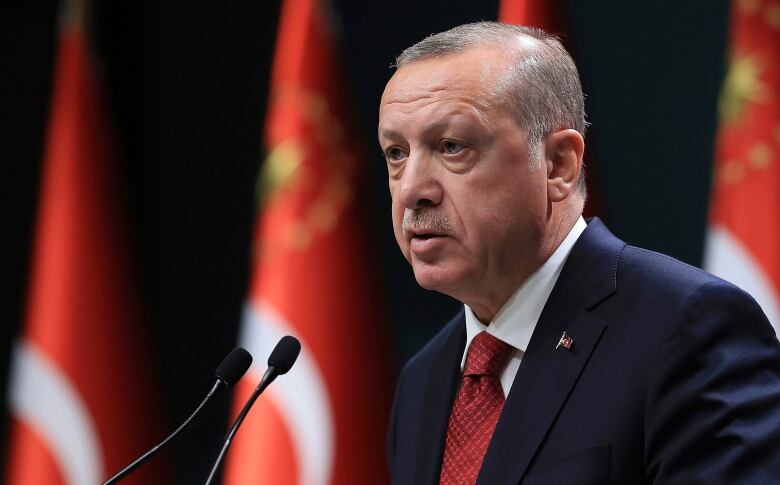Southwest Airlines fined millions for maintenance issues since 2009
Newsletter: A closer look at the day's most notable stories

Welcome to The National Today newsletter, which takes a closer look at what's happening around some of the day's most notable stories. Sign up here and it will be delivered directly to your inbox Monday to Friday.
TODAY:
- Investigation into Tuesday's Southwest Airlines emergency landing likely to put company's maintenance record under scrutiny
- Leaders of Turkey, Armenia strengthen their hold on power
- Formula 1 race drivers will have a new piece of safety equipment next season: biometric gloves
- Missed The National last night? Watch it here
Southwest safety concerns
Air accident investigators are zeroing in on the cause of a horrific in-flight accident in the skies over Pennsylvania yesterday that saw a woman die after she was partially sucked out of a shattered window.
The U.S. National Transportation Safety Board says a fan blade inside one of the Boeing 737's engines appears to have separated, possibly due to metal fatigue, blowing apart the cowling and piercing the fuselage with debris.
The Southwest Airlines flight from New York to Dallas, with 149 people aboard, was forced to make a steep dive after the plane suddenly depressurized. Flying on one engine, the pilot made an emergency landing in Philadelphia.

The full investigation into the accident is expected to last more than a year, but Southwest said it will perform ultrasonic safety inspections on all its other CFM56-type engines over the coming month.
In the summer of 2016, a Southwest flight was forced to make an emergency landing in Florida after an engine blade separation ripped a foot-long hole in its wing. Earlier this month, European aviation authorities ordered non-urgent checks of all CFM56 engines for metal fatigue in response to that 2016 incident.

Southwest is the world's largest operator of 737s, with its 700-plus fleet entirely comprised of the workhorse plane.
There have been persistent concerns about how the discount carrier maintains them. The Federal Aviation Administration has levied multimillion-dollar fines against the airline on three occasions since 2009, with a total of $17.5 million in safety penalties imposed since 2000.
The largest, $7.5 million, pertained to the improper replacement of 44 aircraft skins between 2006 and 2009. In December 2015, Southwest settled an associated civil lawsuit brought by the FAA for an additional $2.8 million.

In April 2011, one of the airline's 737s en route from Phoenix to Sacramento was forced to make an emergency landing after a five-foot hole opened in its roof while it was cruising at an altitude of 34,000 feet. No one was seriously injured. The airline had repaired 21 cracks in the plane's fuselage just a few months before. The NTSB ultimately determined that the fault for the metal fatigue lay with the manufacturer, not the airline.
Airline safety rating services have a mixed opinion of Southwest's record.
For example, airlineratings.com gives Southwest only four out of seven possible stars — the lowest rating of any American carrier — on the basis of past fatalities and a failure to complete a special international safety audit.
A ranking from the Jet Airliner Crash Data Evaluation Centre, based more on incidents per kilometres flown, ranks Southwest 15th among the world's 60 largest airlines — second only to Delta among American carriers.

The union representing airline mechanics has complained about Southwest's plans to contract out some Hawaii-based servicing, raising the point that the airline already employs fewer mechanics than any of its competitors — 3.3 per plane, the lowest ratio in the industry. (United has 11.2 per aircraft, while American has 7.5.)
Southwest obtained its landing permit for Honolulu International Airport in late March, but there has been no word of when the Hawaii service is set to start.
Strongmen getting stronger
Recep Tayyip Erdogan is betting that his stranglehold on power can get even tighter.
The Turkish president today announced a snap election for June 24, more than a year ahead of schedule, saying his country "urgently" needs to transition from a parliamentary system to an executive one.
"Even though the president and government are working in unison, the diseases of the old system confront us at every step we take," the 64-year-old said in a nationally televised address.

The move is an attempt at early access to broad new presidential powers that Turkish voters endorsed in a referendum last year. A total of 18 amendments have been made to the constitution, including the abolition of the office of the prime minister.
Erdogan has ruled Turkey since 2003, first as PM, and since 2014, as the country's first-ever president.

Armenia, Turkey's eastern neighbour, is in the midst of completing the opposite switch, from a presidential system to a parliamentary one. But it is proving no less controversial among opposition parties.

He insists that the new job — which entails running the country, just like his old one — does not constitute a third, consecutive term.
Many voters appear to disagree.
Tens of thousands marched through the streets of Yerevan yesterday and again today, chanting "Take a step. Reject Serzh."
- Enjoying this newsletter? Sign up and have it delivered by email. You may also like our early-morning newsletter, the Morning Brief — start the day with the news you need in one quick and concise read. Sign up here.
Biometrics
Formula 1 race drivers will have a new piece of safety equipment next season — biometric gloves.
The sensor-filled mitts will monitor and transmit the driver's pulse rate, body temperature and blood-oxygen levels.
The information will help teams track stress and performance. But the real selling point is up-to-the-second data in the event of a crash.

The technology will be of particular use in accidents like Carlos Sainz Jr.'s 320 km/h crash during practice at the 2015 Russian Grand Prix, where the Spanish driver ended up trapped underneath a protective barrier. (He escaped serious injury.)

Privacy concerns have so far limited how leagues are using heart rate and other health information, but this winter, NHL Commissioner Gary Bettman expressed his hope that fans at home will soon be able to track every aspect of player performance. (Don Fehr, the executive director of the NHLPA, worries that teams will use the data in contract negotiations.)

Although, not every aspect of the technology seems so advantageous to average joes. One of the big rollouts at a major biometrics conference in Las Vegas this week was an iris-scanning time clock that can identify the comings and goings of employees from up to 15 feet away. Not only does it bypass the dirt and grease that can clog handprint readers, it also frees employers from the scourge of workers "buddy punching" for absent colleagues.
The courts might have the final say, however.

Perhaps not coincidentally, Facebook has just started asking users in Canada and Europe whether they want to allow the program to access their photos.
The software in question is called DeepFace.
Quote of the moment
"We've been looking for him for two years. We need to know what happened to him. Why did it happen? We need to know when he died."
- Suthakaran Thanigasalam, a cousin of Kirushna Kumar Kanagaratnam, tells the CBC that family in Sri Lanka had been frantic since he suddenly stopped calling home in late 2015. The week, Toronto Police identified the 37-year-old as the eighth alleged victim of Bruce McArthur.
What The National is reading
- Hells Angel 'Mom' Boucher pleads guilty to jailhouse plot to kill Mafia rival (Montreal Gazette)
- More than 200 child soldiers freed in Sudan (CNN)
- China flexes muscles with live-fire military drills off Taiwan (CBC)
- Belgian firms prosecuted over Syrian chemical exports (Guardian)
- U.K. TV watchdog investigating Russia Today channel's Skripal coverage (Daily Beast)
- Argentine banks close as employees demand 'dignified' wage (Telesur)
- Broccoli passed off as weed leads to teen's killing (Miami Herald)
- Amateur sleuths ID 'unknown' Marine lost in 73-year-old battle (NY Times)
Today in history
April 18, 1967: Bongs and muffin recipes in hippie Yorkville 'head shop'
Come, take a tour of Canada's "first head shop," the dreadfully named Gandalf's in Yorkville. "The operation appears to be perfectly legal," harumpfs suit-and-tie wearing reporter Larry Bondy, "but it makes no secret that it caters to the needs of the hippies." You can almost hear the murmurs of consternation in Toronto's Mimico neighbourhood.
Sign up here and have The National Today newsletter delivered directly to your inbox Monday to Friday.
Please send your ideas, news tips, rants, and compliments to [email protected].


